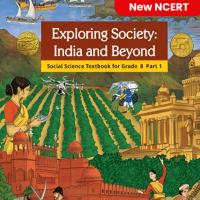Class 8 Exam > Class 8 Questions > ‘Eid’ is a festival of?a)Hindub)M...
Start Learning for Free
‘Eid’ is a festival of?
- a)Hindu
- b)Muslim
- c)Sikh
- d)None of these
Correct answer is option 'B'. Can you explain this answer?
Verified Answer
‘Eid’ is a festival of?a)Hindub)Muslimc)Sikhd)None of thes...
Explanation:
The festival of 'Eid' is primarily celebrated by Muslims.
Here is a detailed explanation:
1. Eid:
- Eid is an Arabic word that means "festival" or "feast."
- It is a significant religious festival celebrated by Muslims worldwide.
- There are two main types of Eid: Eid al-Fitr and Eid al-Adha.
2. Eid al-Fitr:
- Eid al-Fitr, also known as the "Festival of Breaking the Fast," marks the end of Ramadan.
- Ramadan is the holy month of fasting observed by Muslims.
- It is a joyous celebration that begins with a special prayer called Salah al-Eid.
- Muslims gather in mosques or open spaces to offer prayers and listen to sermons.
- They also visit family and friends, exchange gifts, and share meals together.
- It is a time of forgiveness, gratitude, and spreading happiness.
3. Eid al-Adha:
- Eid al-Adha, also known as the "Festival of Sacrifice," commemorates the willingness of Ibrahim (Abraham) to sacrifice his son as an act of obedience to God.
- Muslims around the world sacrifice animals, such as sheep, goats, or cows, to remember Ibrahim's devotion.
- The meat from the sacrificed animal is divided into three parts: one-third is shared with family and friends, one-third is given to the needy, and one-third is kept for personal consumption.
- Muslims also gather for prayer, listen to sermons, and engage in acts of charity during this festival.
4. Cultural Significance:
- Eid is not only a religious festival but also holds cultural significance.
- It strengthens the bond between family members, friends, and the community.
- It fosters a sense of unity, compassion, and generosity.
- Muslims dress in traditional attire, decorate their homes, and prepare special dishes for the occasion.
- It is a time of joy, celebration, and reflection on the values of Islam.
Conclusion:
- In conclusion, Eid is a festival celebrated primarily by Muslims.
- It is an important religious and cultural observance that promotes unity, gratitude, and compassion within the Muslim community and beyond.
The festival of 'Eid' is primarily celebrated by Muslims.
Here is a detailed explanation:
1. Eid:
- Eid is an Arabic word that means "festival" or "feast."
- It is a significant religious festival celebrated by Muslims worldwide.
- There are two main types of Eid: Eid al-Fitr and Eid al-Adha.
2. Eid al-Fitr:
- Eid al-Fitr, also known as the "Festival of Breaking the Fast," marks the end of Ramadan.
- Ramadan is the holy month of fasting observed by Muslims.
- It is a joyous celebration that begins with a special prayer called Salah al-Eid.
- Muslims gather in mosques or open spaces to offer prayers and listen to sermons.
- They also visit family and friends, exchange gifts, and share meals together.
- It is a time of forgiveness, gratitude, and spreading happiness.
3. Eid al-Adha:
- Eid al-Adha, also known as the "Festival of Sacrifice," commemorates the willingness of Ibrahim (Abraham) to sacrifice his son as an act of obedience to God.
- Muslims around the world sacrifice animals, such as sheep, goats, or cows, to remember Ibrahim's devotion.
- The meat from the sacrificed animal is divided into three parts: one-third is shared with family and friends, one-third is given to the needy, and one-third is kept for personal consumption.
- Muslims also gather for prayer, listen to sermons, and engage in acts of charity during this festival.
4. Cultural Significance:
- Eid is not only a religious festival but also holds cultural significance.
- It strengthens the bond between family members, friends, and the community.
- It fosters a sense of unity, compassion, and generosity.
- Muslims dress in traditional attire, decorate their homes, and prepare special dishes for the occasion.
- It is a time of joy, celebration, and reflection on the values of Islam.
Conclusion:
- In conclusion, Eid is a festival celebrated primarily by Muslims.
- It is an important religious and cultural observance that promotes unity, gratitude, and compassion within the Muslim community and beyond.
 This question is part of UPSC exam. View all Class 8 courses
This question is part of UPSC exam. View all Class 8 courses

|
Explore Courses for Class 8 exam
|

|
Question Description
‘Eid’ is a festival of?a)Hindub)Muslimc)Sikhd)None of theseCorrect answer is option 'B'. Can you explain this answer? for Class 8 2025 is part of Class 8 preparation. The Question and answers have been prepared according to the Class 8 exam syllabus. Information about ‘Eid’ is a festival of?a)Hindub)Muslimc)Sikhd)None of theseCorrect answer is option 'B'. Can you explain this answer? covers all topics & solutions for Class 8 2025 Exam. Find important definitions, questions, meanings, examples, exercises and tests below for ‘Eid’ is a festival of?a)Hindub)Muslimc)Sikhd)None of theseCorrect answer is option 'B'. Can you explain this answer?.
‘Eid’ is a festival of?a)Hindub)Muslimc)Sikhd)None of theseCorrect answer is option 'B'. Can you explain this answer? for Class 8 2025 is part of Class 8 preparation. The Question and answers have been prepared according to the Class 8 exam syllabus. Information about ‘Eid’ is a festival of?a)Hindub)Muslimc)Sikhd)None of theseCorrect answer is option 'B'. Can you explain this answer? covers all topics & solutions for Class 8 2025 Exam. Find important definitions, questions, meanings, examples, exercises and tests below for ‘Eid’ is a festival of?a)Hindub)Muslimc)Sikhd)None of theseCorrect answer is option 'B'. Can you explain this answer?.
Solutions for ‘Eid’ is a festival of?a)Hindub)Muslimc)Sikhd)None of theseCorrect answer is option 'B'. Can you explain this answer? in English & in Hindi are available as part of our courses for Class 8.
Download more important topics, notes, lectures and mock test series for Class 8 Exam by signing up for free.
Here you can find the meaning of ‘Eid’ is a festival of?a)Hindub)Muslimc)Sikhd)None of theseCorrect answer is option 'B'. Can you explain this answer? defined & explained in the simplest way possible. Besides giving the explanation of
‘Eid’ is a festival of?a)Hindub)Muslimc)Sikhd)None of theseCorrect answer is option 'B'. Can you explain this answer?, a detailed solution for ‘Eid’ is a festival of?a)Hindub)Muslimc)Sikhd)None of theseCorrect answer is option 'B'. Can you explain this answer? has been provided alongside types of ‘Eid’ is a festival of?a)Hindub)Muslimc)Sikhd)None of theseCorrect answer is option 'B'. Can you explain this answer? theory, EduRev gives you an
ample number of questions to practice ‘Eid’ is a festival of?a)Hindub)Muslimc)Sikhd)None of theseCorrect answer is option 'B'. Can you explain this answer? tests, examples and also practice Class 8 tests.

|
Explore Courses for Class 8 exam
|

|
Signup for Free!
Signup to see your scores go up within 7 days! Learn & Practice with 1000+ FREE Notes, Videos & Tests.























